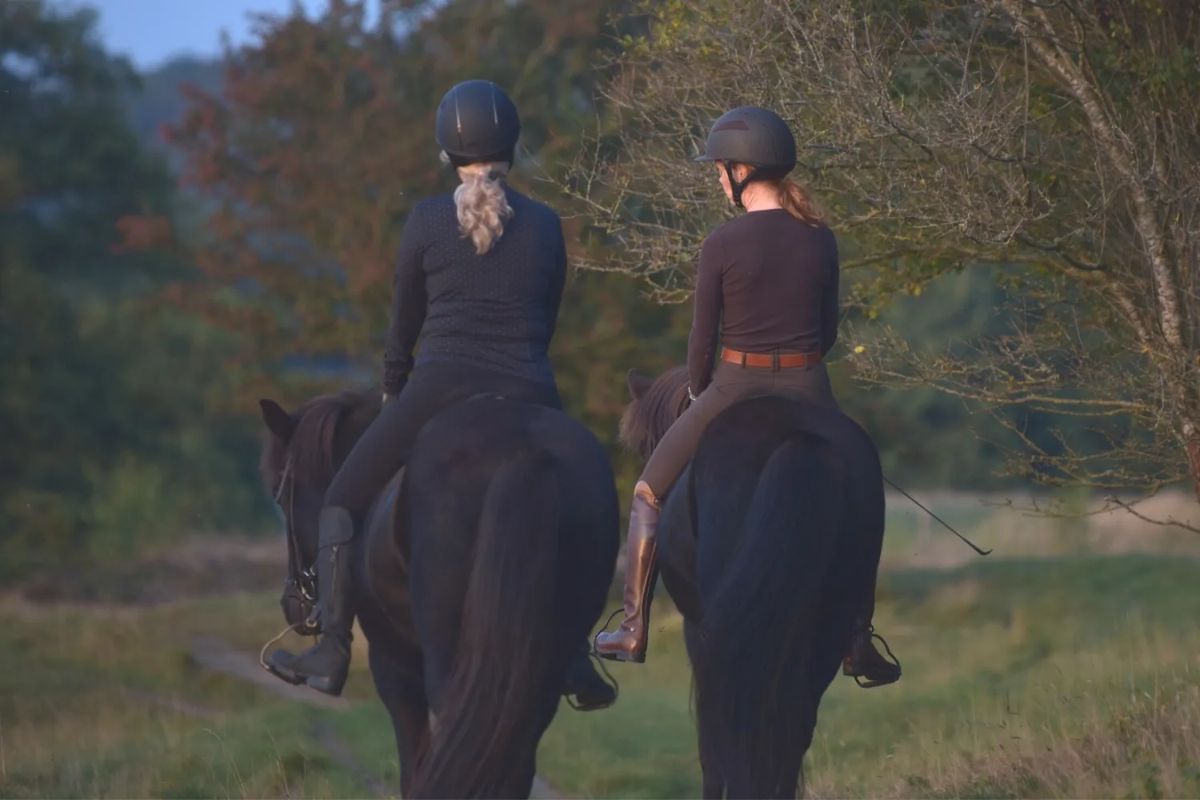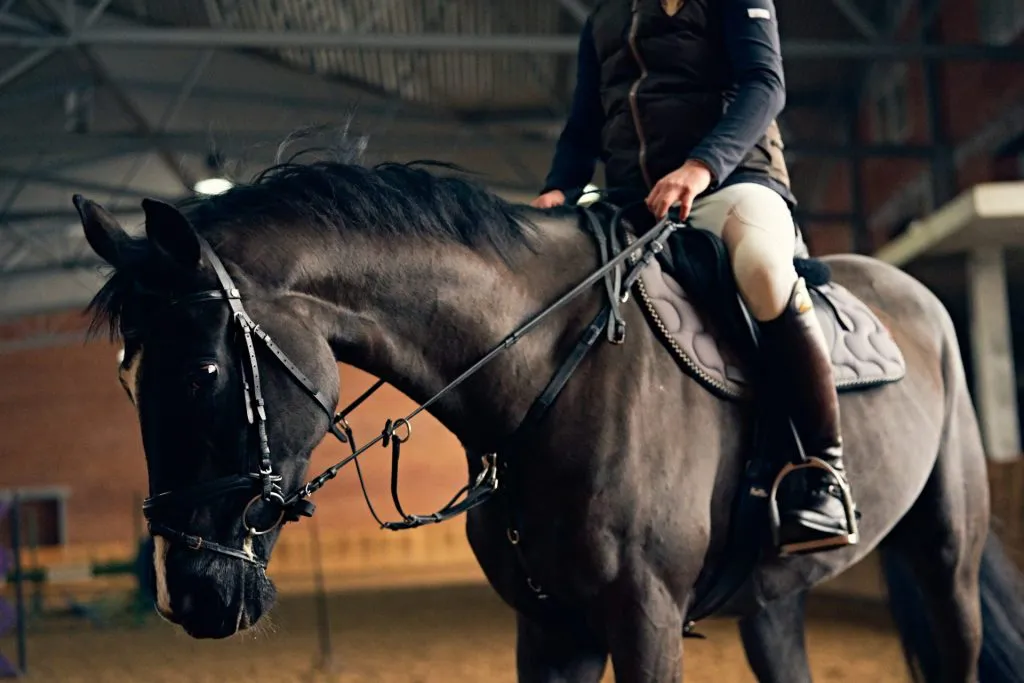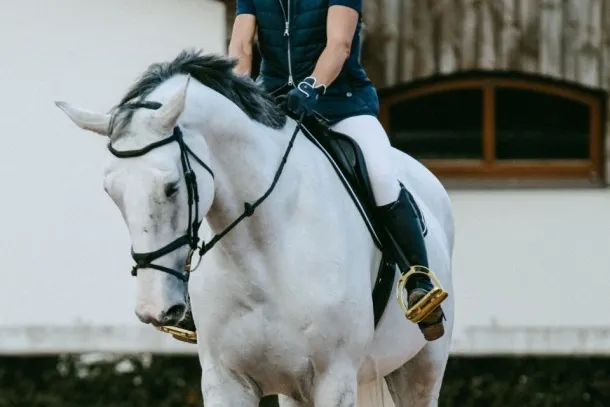Menu

In the world of equestrianism, there are broadly two types of riders. There's the rider who loves to ride within the dry and safe confines of an indoor arena, and the rider who either loves or is compelled to always ride outdoors. Each has their reasons for preferring one over the other - that is, outdoors or indoor arena. But what about the horse? What would it prefer? We aim to answer that here, but first, let's clarify the distinction between these two types of riders.
Though it might be a bit simplistic, we can't resist outlining these two archetypes. Which do you think you align with more?
The Indoor Rider is the one who loves to ride within the secure walls of the indoor arena. That is, unless the stars align, the sun is shining, and the wind is less than 1 m/s. If that happens, the Indoor Rider can't resist and might venture out onto the track. Otherwise, they prefer not to tempt fate more than absolutely necessary. Better safe than sorry.

The Outdoor Enthusiast either doesn't have access to an indoor arena or simply believes there's no need for one. After all, nature is wonderful - except perhaps when it's raining cats and dogs or the track is frozen solid. In such situations, the Outdoor Enthusiast might secretly wish for a roof overhead, even if they'd never admit it. Instead of an indoor arena, they've splurged on rain gear, ear warmers, and a rain sheet for the horse. This rider has simply come to terms with the fact that their gear often looks like it's been through a cross-country military event after a muddy ride.

Also read: 9 Typical Stereotypes About Horse Folk
Let's clarify why having an indoor arena can be quite beneficial. While it might be a luxury for the rider, it can also be advantageous for the horse to train indoors occasionally.
There's no doubt that it's nice to shut out the rain and wind when training your horse. But this isn't just for the rider's benefit. Horses, as we know, aren't fond of rain directly on their heads, making many a bit more resistant, distracted, and thus harder to work with in bad weather. Perhaps this is one of the main reasons many have access to an indoor arena?
Even though most indoor arenas aren't insulated and can't maintain room temperature, they're never as cold as outside. This can be beneficial for the horse's breathing. David Marlin, a renowned British vet with expertise in equine respiration, explains that air below five degrees affects the nerves in a horse's airways, potentially causing coughing. Thus, the air in an indoor arena, which is typically warmer than outside, could hypothetically be better for a horse's breathing on cold days.
Safety is another aspect where indoor arenas shine. The reason many indoor arenas have sloping barriers is so that both rider and horse can quickly get away if they fall into it. This is in stark contrast to outdoor arena fences, where a horse's leg or even a rider could get trapped if things don't go as planned.
Now, let's discuss the outdoor arena. It has its advantages, primarily the fresh air and the opportunity to train your horse to be indifferent to its surroundings.
There's no doubt that a dusty indoor arena isn't ideal for the horse, especially if it suffers from allergies. However, an outdoor arena can be even dustier than a well-maintained indoor one if it's not watered during dry spells. In essence, if you compare a well-watered outdoor arena to a well-maintained indoor one, the air outside is likely fresher - unless, of course, you keep one end of the indoor arena open or air it out during the day. When a horse gets more fresh air, it can also draw more oxygen to its working muscles. Therefore, fresh air is always preferable when training a horse intensively.
Another advantage is the environmental training that comes with having a horse adapt to various weather conditions and surroundings. Both rider and horse might find it bothersome to deal with the wind's whistle and rain in their eyes when trying to focus. But what about the day you're at a competition and the weather turns just as you're about to enter the arena? There's no mercy then, and here the outdoor rider clearly has an edge. In fact, it can be quite liberating to force oneself to ride outdoors, as the horse will eventually learn to be more or less indifferent to its surroundings - to a certain extent, of course.
Now, let's discuss the last - and perhaps slightly convoluted - advantage. As you probably know, both humans and animals convert the sun's rays into vitamin D. This vitamin is crucial for producing enough serotonin in the brain, which makes us feel happy and content. And this applies to horses as well. Anja Thorup, a specialist in equine behaviour and welfare, explains...
"Light conditions play a significant role in our horses' well-being, as light helps synchronise various biological rhythms like sleep, shedding, and mating with the environment."
Anja Thorup, Modern Horse Care.
Light is essential for a horse's body to function properly. Therefore, it's crucial to expose them to as much of it as possible - especially if they don't spend much time in the paddock and are kept in a dimly lit stable.
The Horse Keeping Act also mentions that one should always strive to let horses follow the natural day-night cycle, experiencing consistent and appropriate periods of light and darkness (§ 14, para. 2). For this reason, some indoor arenas and stables are brilliantly lit, which helps. But artificial light can never replace the sun when it comes to obtaining enough vitamin D. Therefore, it's essential to get your horse outside whenever possible. And fortunately, the sun doesn't care if it's windy or if the arena is soaking wet. Sun rays are sun rays, and they contain vitamin D regardless of the prevailing weather conditions.
What would you choose? Outdoor or indoor arena?